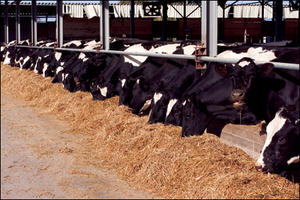AgroterrorismHow vulnerable is the U.S. to agro-terror attack?
Since the 9/11 terrorist attacks, the United States has spent billions of dollars to make the country safer from another catastrophic event, but little of that money, and little attention, have been directed toward preventing, coping with, and recovering from a terrorist agro-attack; how vulnerable is the United States to an attack on its food system?

Agriculture is the least prepared sector for terror strike response // Source: fbi.gov
Since the 9/11 terrorist attacks, the United States has spent billions of dollars to make the country safer from another catastrophic event, but little of that money, and little attention, have been directed toward preventing, coping with, and recovering from an agro-attack. How vulnerable is the United States to an attack on its food system? Newsmagazine Network reports that an article in the February 2012 issue of the FBI Bulletin offers some answers.
“When American and allied forces overran al Qaeda sanctuaries in the caves of eastern Afghanistan in 2002, among the thousands of documents they discovered were U.S. agricultural documents and al Qaeda training manuals targeting agriculture,” The FBI says.
Bill Dorsey, a weapons of mass destruction coordinator at the St. Louis FBI office, defined argoterrorism as the use of chemical, biological, radiological, nuclear, or explosive agents against the agricultural/food sector. The goal would be to cause illness, death, economic disruption, and fear and to undermine confidence in government. He says that the risk of an attack is low at this time, but the potential ramifications of an attack are very high.
Of all the U.S. infrastructures sectors, the agricultural sector is the least protected.
Experts have estimated that a premeditated introduction of an unknown pathogen on a few farms could escalate and spread across twenty-five states in a week or less.
One example of an agro-attack in the U.S. is when a religious cult in Oregon intentionally contaminated ten restaurant salad bars with salmonella in 1994, sickening more than 750 people, in an attempt to influence the outcome of a local election.
The Rand Corporationsaid its research has concluded that “A major agroterrorist attack would have substantial economic repercussions, especially when allied industries and services – suppliers, transporters, distributors, and restaurant chains – are taken into account. The fiscal downstream effect of a deliberate act of sabotage would be multidimensional, reverberating through other sectors of the economy and ultimately impacting the consumer.”
According to Newsmagazine Network, the FBI has listed four groups which could possibly initiate an attack.
- Transnational groups such as al Qaeda, viewed by many as presenting the most probable threat.
- Economic opportunists attempting to manipulate the markets for personal gain
- Domestic terrorists who want to strike a blow against the federal government
- Militant animal rights or environmental activists who could view an attack on the animal food industry as a positive event.
The threat of an agro-attack has made it to the headlines, but the government and the private sector have taken preventative steps.
DHS Centers of Excellence have started research on zoonotic and animal disease defense, and the International Symposium on Argoterrorism, sponsored by the FBI has been held in Kansas City every three years since 2005, with the next one set for 2014.
State and federal agency officials in fourteen states in the Midwest, Great Plains, and other areas where agriculture is significant, created the Multi-State Partnership for Security in Agriculture to coordinate emergency preparedness and response measures.
The 2002 Bioterrorism Preparedness and Response Actcontains provisions that affectagriculture. The FDA set new rules which force businesses to register food processors, and give prior notice on the import of any food.
Dorsey knows that a significant part of dealing with any attack is to isolate it before it gets out of hand,and argoterrorism is no different. “The speed of detecting and diagnosing a terrorist act and controlling its impact can spell the difference between an isolated incident and a disaster,” Dorsey told Newsmagazine Network.
